Africa Day 2025 Commemorated in Mauritius with a Powerful Call for Reparative Justice.
Africa Day 2025 was celebrated in Mauritius on 30 May 2025 at the African Learning Centre for Higher Education in Pamplemousses. This year, the African Union declared 2025 as the Year of “Justice for Africans and People of African Descent through Reparation.” The celebration in Mauritius reflected this powerful theme.
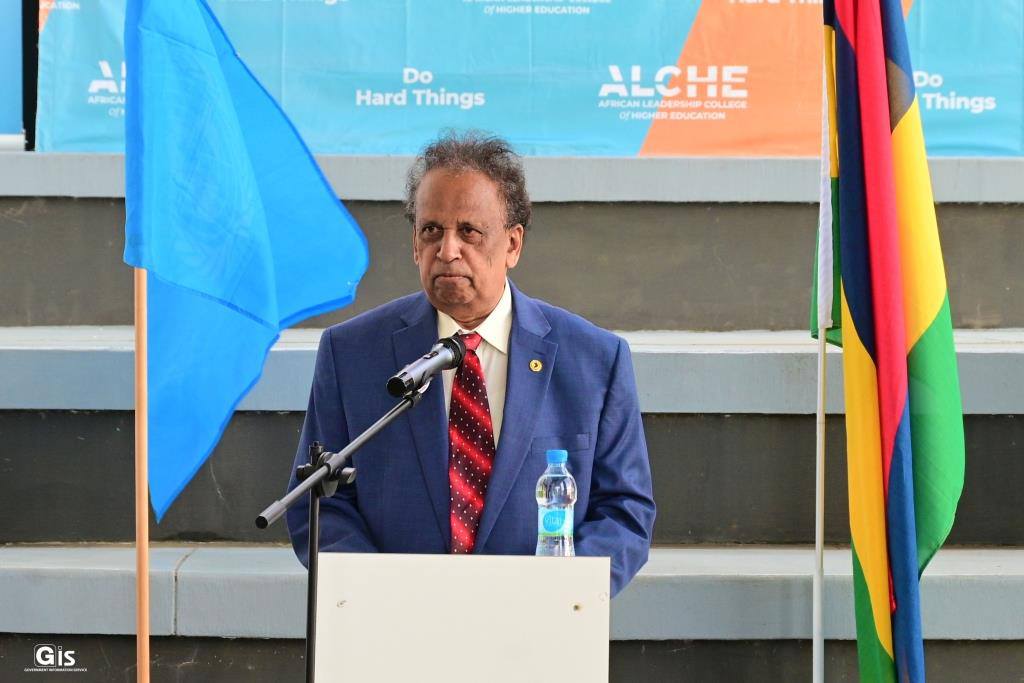
A symbolic connection was made with history, recalling a bullet that had been sent in an envelope with life-threatening intent during the mid-1970s. This was due to open support provided to African Liberation Movements. The event in 2025 stood as a mark of progress and reparation. Mauritius had achieved full independence with the British recognition of its complete sovereignty on 22 May 2025.
The commemorative symposium was jointly organized by the Brahma Kumaris, Inner Space, the African Learning Centre for Higher Education, and the United Nations Association of Mauritius.
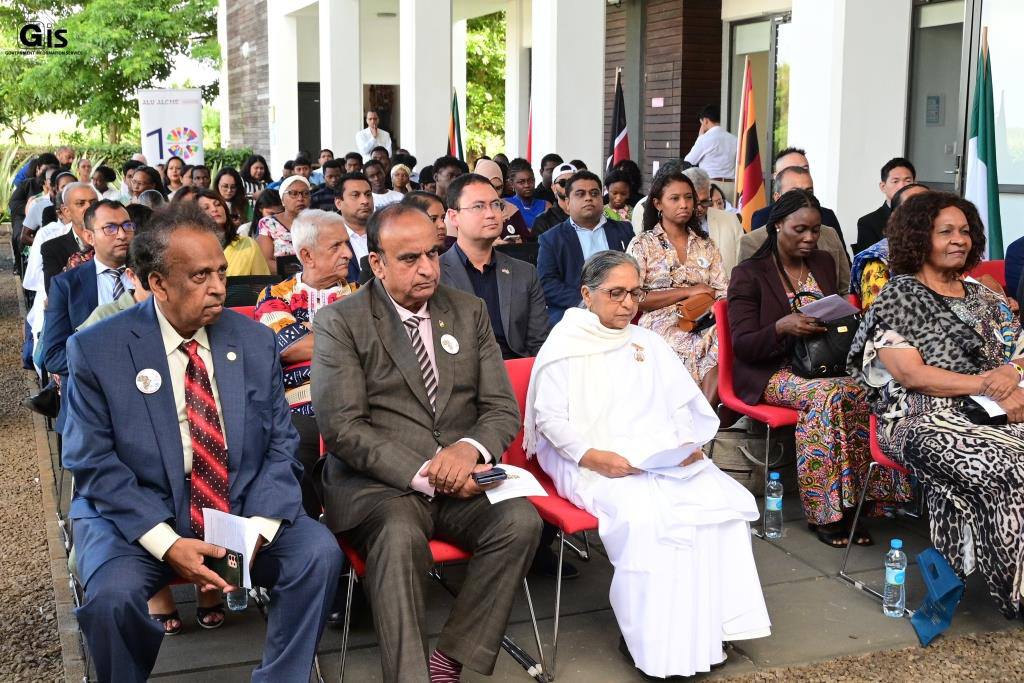
His Excellency Mr Jean Yvan Robert Hungley, Vice President of the Republic of Mauritius, was the chief guest. Hon Hambyrajen Narshinghen, Junior Minister at the Ministry of Foreign Affairs, Regional Integration and International Trade, and Her Excellency Ms Lisa Simrique Singh, United Nations Resident Coordinator, also delivered their messages.
Dr Gowtam Chintaram, CSO Engagement Officer at ECOSOC of the African Union, Sister Gaitree, Chairperson of the Brahma Kumaris, Mr Veda Sunassee, CEO of the African Leadership College, and Mr Nundkeswarsing Bossoondyal, CEO of UNA Mauritius, addressed the symposium as well.
The event was graced by the High Commissioner of South Africa to Mauritius, Dr Hlamalani Nelly Manzini, along with representatives from the United States Embassy, the High Commission of India, the United Nations Development Programme, and several consuls accredited to Mauritius.
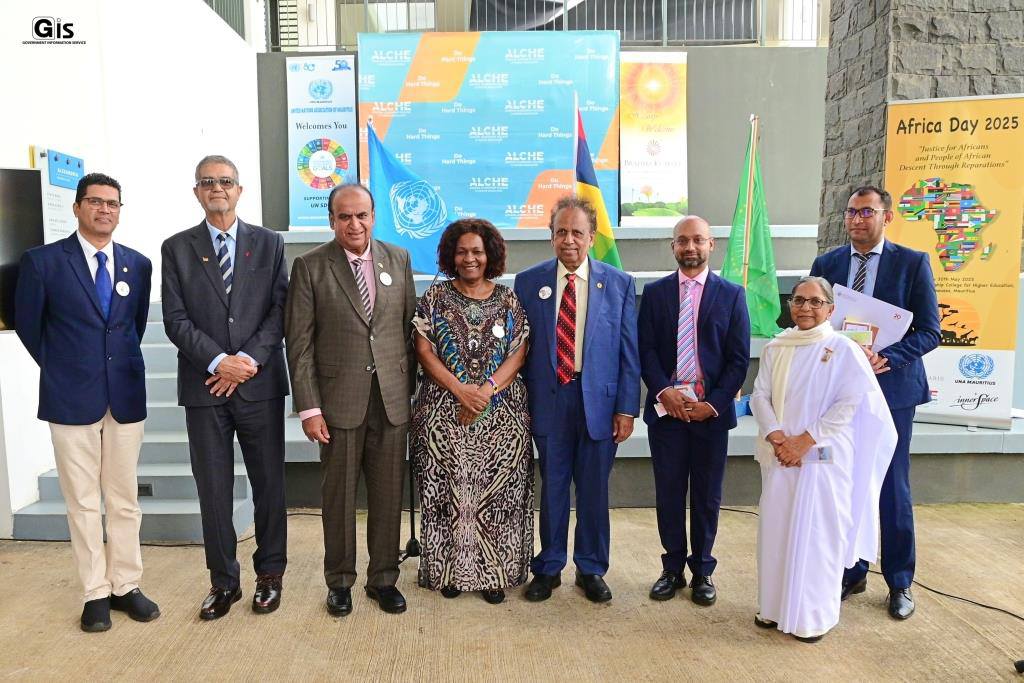
Two panel discussion groups were convened:
Panel One was on the theme “Restoring Dignity: Legal, Cultural, and Historical Pathways to Reparatory Justice.” It was moderated by Mrs Tasmeem Jaumally, Director of Honoris Educational Network-Mauritius. Speakers included Dr Francois Sarah, Entrepreneurship Program Manager at ALCHE, Ms Krishnee Appadoo, Senior Lecturer at the University of Mauritius, and Mr Nundkeswarsing Bossoondyal, CEO of UNA Mauritius.
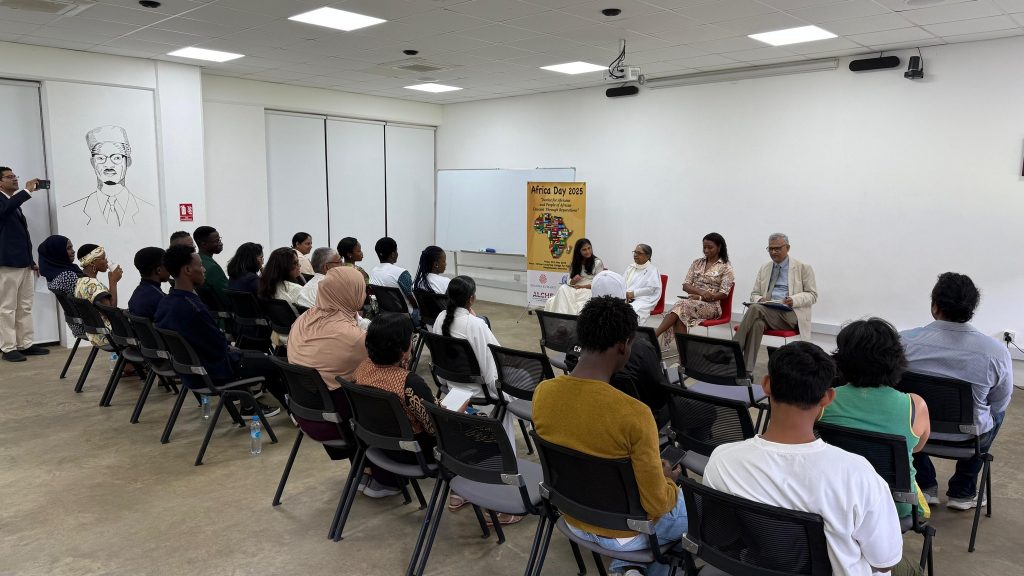
Panel Two focused on “Spiritual Healing for Justice: The Role of Meditation and Spirituality in Reparations.” It was moderated by Dr Andatta Teelokee, author and writer. Speakers included Sister Gaitree, Chairperson of Brahma Kumaris, Miss Meghna Raghoobar, social worker, and Dr Mylene Lecoq Bamboche, psychologist.
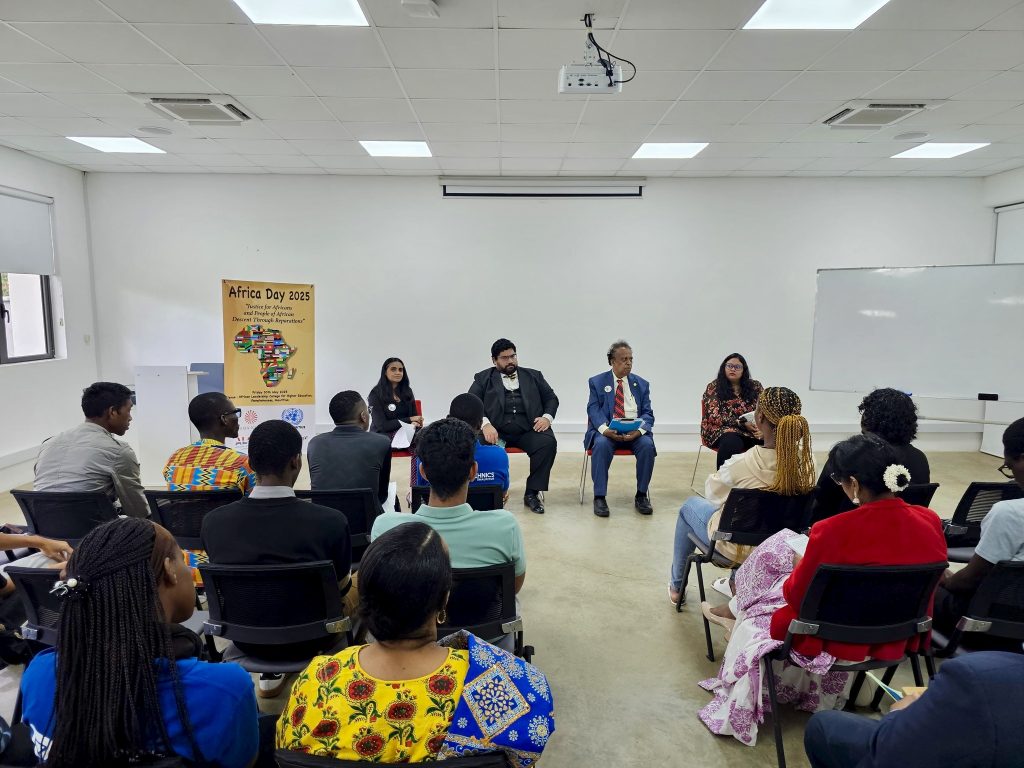
Mr Dewendra Vikram Dookna acted as Master of Ceremony. The vote of thanks was delivered by Mrs Padmini Gaya Gookool, Vice President of UNA Mauritius.
Excerpts from GIS Coverage:
Quote: “The symposium on Justice for Africans and People of African Descent through Reparations was inaugurated by Vice President Jean Yvan Robert Hungley at the African Leadership Campus in Beau Plan.
In his keynote address, the Vice President highlighted Mauritius as a strategic and symbolic bridge between Africa and Asia, committed to building an inclusive and just future. He emphasized Mauritius’s sovereignty over the Chagos Archipelago as a historic milestone in the effort to repair injustices and acknowledge the hardships of the Chagossian community. Africa Day, he noted, stands as a global call for concrete actions against the legacy of slavery, colonisation, apartheid, and genocide. It is a reaffirmation of unity, peace, and sustainable development.
Junior Minister Narshinghen underlined the importance of multilateralism in addressing global challenges including climate change, food insecurity, energy depletion, and unfair trade. He confirmed Mauritius’s dedication to the vision of the African Union for growth, integration, and meaningful cooperation.
Ms Lisa Simrique Singh commended Mauritius for its peaceful diplomacy that led to the return of the Chagos Archipelago. She praised the establishment of a trust fund to safeguard the rights and welfare of the Chagossian people and acknowledged the nation’s advocacy for justice on the global stage”. End of quote. Courtesy of GIS with photos
AFRICA DAY25: Symposium held on 30 May 2025 at African Leadership Centre for Higher Education (ALCHE), Pamplemousses. It was organized by Brahma Kumaris, Inner Space, ALCHE and United Nations Association of Mauritius. Theme: “JUSTICE FOR AFRICANS AND PEOPLE OF AFRICAN DESCENT THROUGH REPARATIONS”.
Speech delivered by Mr. Nundkeswarsing Bossoondyal, CEO, United Nations Association of Mauritius.
Quote “Thank You Mr. Dewendra Dookna, Master of Ceremony for giving the floor.
1. H.E Mr. Jean Yvan Robert Hungley, Vice President of the Republic of Mauritius
2. Hon. Hambyrajen Narsinghen, Junior Minister at Ministry of Foreign Affairs, Regional
Integration and International Trade,
3. Excellency Mrs. Manzini, the High Commissioner of South Africa
4. Her Excellency Ms. Lisa Simrique Singh, United Nations Resident Coordinator
accredited to Mauritius and Seychelles,
5. Mr. Paul Stilley, Deputy Political Economic Section Chief of the Embassy of The United
States of America,
6. Mrs. Veena Suthan, Representative of the Indian High Commission,
7. Dr. Gowtam Raj Chintaram, Desk Officer, ECOSOCC, African Union
8. Sister Gaitree, Chairperson, Brahma Kumaris-Mauritius
9. Mr. Veda Sunassee, Director African Leadership Centre for Higher Education
10. Ms. Zeida Vrolick Director of Indian Ocean Rim Association,
11. Mr. Sjamsu Rahardja, Resident Representative of the World Bank.
12. Consuls of: Consul of Ghana, Ivory Coast and Comoros Consuls in Mauritius,
13. Dear invites, participants, and Media representatives attending the Africa day
commemorations,
Excellencies, and Esteemed guests
With all protocol respected,
On behalf of the Central Executive Council and members of the United Nations Association of Mauritius, it gives us immense pleasure to congratulate the organizing committee, namely the Brahma Kumaris Mauritius, the African Leadership College for Higher Education and the United Nations Association of Mauritius, for organizing this symposium marking Africa Day 2025.
We wish further to hail the African Union and its respective organs for marking Africa Day 2025 with the central theme of “JUSTICE FOR AFRICANS AND PEOPLE OF AFRICAN DESCENT THROUGH REPARATIONS”.
The United Nations Resolution 1514 (XV-15), adopted in 1960, declares the necessity of ending colonialism and affirms the right of all people to self-determination. It is a cornerstone of the UN’s role in assisting the movement for independence in non-self-governing territories and declares that all people have a right to self-determination.
The decolonization of Africa was a series of political developments that spanned from the mid-1950s to 1975. During the Cold War, colonial governments gave way to sovereign states in a process often marred by violence, political turmoil, widespread unrest, and organized revolts.
The Scramble for Africa between 1870 and 1914 was a significant period of European imperialism in Africa that ended with almost all of Africa and its natural resources claimed as colonies by European powers, who raced to secure as much land as possible while avoiding conflict amongst themselves. The partition of Africa was confirmed at the Berlin Conference of 1885, without regard to the existing political and social structures.
Almost all the precolonial states of Africa lost their sovereignty. The only exceptions were Liberia, which had been settled in the early 19th century by formerly enslaved African Americans and was recognized as independent by the United States in 1862, and Ethiopia, which was later liberated from the fascist colonial power of Italy.
Following the independence of Ghana in 1957, led by Kwame Nkrumah, several other African countries mobilized for their liberation. The liberation wars of Africa have shaped history. Political and social independence was achieved in several African countries after national liberation wars. In many cases, the liberation movements eventually achieved their ultimate aim, at the cost of enormous sacrifices, and managed to gain access to power.
Let me talk about my personal experience during the Southern African Liberation period. I was once in Angola as leftist youth leaders supported the African Liberation Movement. Angola was already liberated. But neighboring Namibia was still being plagued by the white South African apartheid regime. A camp was organized by the Angolan freedom fighters for us to go into Namibia and boost the morale of the SWAPO guerilla force. I made a ramp for a kilometer in cassava plants with a bag of humanitarian items on my back. I was scratched by barbed wire on my back. Upon reaching Namibia, we delivered the goods, joined the training camp, and played our leadership role. But we could not find any medicine. In the end, I noticed Tulsi plants growing wild and shared the information that they could be used as herbal medicine. I applied it to my scratches, and it healed my wounds. There was no food, no proper water, or any other basic necessities, as all were under the control of the apartheid regime.
Therefore, I can say that the African liberation process was extremely hard. I witnessed the same in other parts of Africa as well. The last African Liberation Movement that I joined was the Front Polisario of Western Sahara in its fight with Morocco for independence, which is still ongoing.
So, the theme of reparations for Africans and people of African descent is necessary. It cannot be forgotten just like that. But in my supports to African Liberation Movement in fights for their freedom, liberty and independence, while creating awareness in Mauritius via public meetings, forums, debates, conferences, press release, while denouncing continuous occupations, and all sorts of abuses from the colonizers, in return I got a bullet in an envelope with hand writing letter threatening my life if I continue promoting the African Liberations Movement in Namibia, South Africa and Rhodesia, now Zimbabwe. The bullet and the threatening letter were handed to the Mauritius Police in the mid of the 70’s
At the very least, a big “SORRY” from the foreign colonizers in Africa must come forward. Besides reparations for the harsh rule of the colonizers, the return of African belongings that were taken away, the cost of suffering leading to deep poverty, and the exploitation of Africans must be considered by the African Union, and why not the United Nations, in transforming that backwardness into new development and rebuilding the African economic and social infrastructure.
However, the liberation of many African states would not have been possible without Africans themselves and the concrete assistance from the USSR at the time, as well as from China. African liberations were also supported by many other independent states such as India, Cuba, Vietnam, and many other socialist and progressive countries.
I would now like to focus on the liberation and independence of Mauritius. Though we gained our independence from the British colonial power, it was only a partial independence in 1968. Mauritius can now be considered the last country in Africa to have achieved full and complete independence, with the recognition of our national sovereignty on the 22nd of May 2025, following the signing of Mauritian sovereignty over the Chagos Archipelago.
We appreciate that both the previous and current governments of Mauritius have played a strong diplomatic role in reclaiming the Chagos Archipelago. Although we may not fully agree with the terms and conditions, we are pleased to have recovered our sovereignty over Chagos.
However, we at UNAMAURITIUS, and previously SWYL-MAURITIUS since 1971, have carried out international awareness campaigns regarding the illegal occupation by the British of our Chagos Archipelago. In June 1971, at a left-oriented world youth conference in North Korea, we voiced our concern and called for the reattachment of the Chagos Archipelago. Most youth leaders from around the world found it difficult to understand how Mauritius had gained independence in 1968, while revolutionary youth were still calling for complete decolonization. So, we carried out a continuous campaign of awareness at most regional and international events.
In 1974, we held a national youth conference on the demilitarization of the Indian Ocean and for the reattachment of the Chagos Archipelago with slogans such as “Rande nou Diego”. The conference was held at Stratford College, Champ de Mars, Port-Louis.
The late Sir Seewoosagur Ramgoolam, then Prime Minister, attended our youth conference as Chief Guest. As a young revolutionary, full of vigor and energy at the age of around 20, I called upon the British to respect UN Resolution 1514 (XV) and provide Mauritius with full independence through the reattachment of Chagos. It was the first time Sir Seewoosagur saw Mauritian youth actively claiming back the Chagos Archipelago. He openly congratulated our efforts in the struggle for the complete territorial independence of Mauritius.
Sir Seewoosagur then told us that he had done whatever was possible between 1965 and 1968 to negotiate the independence of Mauritius without bloodshed. At that time, most African countries were engaged in bloody struggles for their independence. Sir Seewoosagur asked us: “You, the young people, how many among you, your brothers, fathers, and family would have been ready to take up arms and fight for the independence of Mauritius?” The conference hall was completely silent. We were shocked, as we had never expected such a declaration. He went on to explain that he had reached an agreement with the British in 1965, in which they proposed a bargain: to cede the Chagos Archipelago to the British to build a telecommunications installation that would capture weather and cyclonic developments for the benefit of Mauritius and neighboring countries.
It would be a short-term lease of 50 years, after which Mauritius would recover its national territory. That is why Sir Seewoosagur accepted the British offer, ensuring there would be no bloodshed by the Mauritian people. These are the factual statements given by the late Sir Seewoosagur Ramgoolam, and I am a witness to them. You may agree or disagree, but this is what SSR said, this is the fact and reality.
UNAMAURITIUS will soon publish a booklet on this matter.
After 1975, UNA-MAURITIUS and its youth wing, the Socialist Working Youth League of Mauritius, due to their regional and international affiliations, carried the Chagos files to each and every event. We called for support for the reattachment of our national territorial sovereignty, and our campaign continued for a long time. Today, we are pleased to have regained our rights over the Chagos Archipelago.
Documents and photos on Diego Garcia/Chagos were exhibited as part of an awareness campaign in Sochi, Russia, in 2017. I am pleased to mention that Mr. Vikram Dookna and Hon. Rubna Daureeawo, both had led the exhibition of documents and photos relating to the occupation of the Chagos Archipelago at the 19th World Youth and Students Festival held in Russia. Some 40,000 youth from 190 countries attended the festival, and large numbers of foreign visitors visited our stand on the awareness campaign for Diego Garcia.
As an affiliate member of the World Federation of United Nations Associations (WFUNA), UNA-MAURITIUS regularly presented resolutions at general conferences, calling on the British Government to respect UN Resolution 1514 (XV-15) and cede Mauritius complete independence by recognizing its sovereignty over the occupied Chagos territory. At the 42nd WFUNA Plenary Assembly in Punta Cana in 2018, we presented a draft resolution on the reattachment of the Chagos Archipelago to Mauritius. It was unanimously adopted. Hon. Rubna Daureeawo, then President of UNA-MAURITIUS, was the co-author of that resolution on the recovery of Mauritius of its national sovereignty – Chagos, to complete our full independence under UN Resolution 1514 (XV-15), gracefully signed last week.
To conclude, on 26 October 2018, through arrangements made by Hon. Jeremy Corbyn, then Leader of the British Labour Party and Shadow Prime Minister, I had a fruitful meeting at the British Parliament with Hon. Emily Thornberry, MP, Shadow Secretary of State for Foreign and Commonwealth Affairs.
The meeting focused exclusively on the British occupation of the Chagos Archipelago. I pleaded with her to convince her party leadership to support the full independence of Mauritius and recovery of national sovereignty under UN Resolution 1514 (XV-15). After two hours of engaging discussion, during which I handed over all related documents from our archives, including some provided by the Prime Ministers offices of Mauritius, she was surprised by the facts presented by our NGO.
Since early 2017, UNAMAURITIUS has also carried out large worldwide campaigns with our partners, United Nations Associations from some 125 countries, urging them to lobby their respective governments to support the case of the Government of Mauritius at the United Nations and the ICJ concerning the Chagos Archipelago.
The UK’s continued administration of the Chagos, illegally separated from Mauritius in 1965, violates decolonization principles and international law.
Long live African Unity. Yes, high time for African former colonizers now to come forward with reparation for the untold African history, suffering, exploitation of natural resources, violence in all forms and causing the backwardness in all spheres of development in Africa”. Thank You”. End of quote.
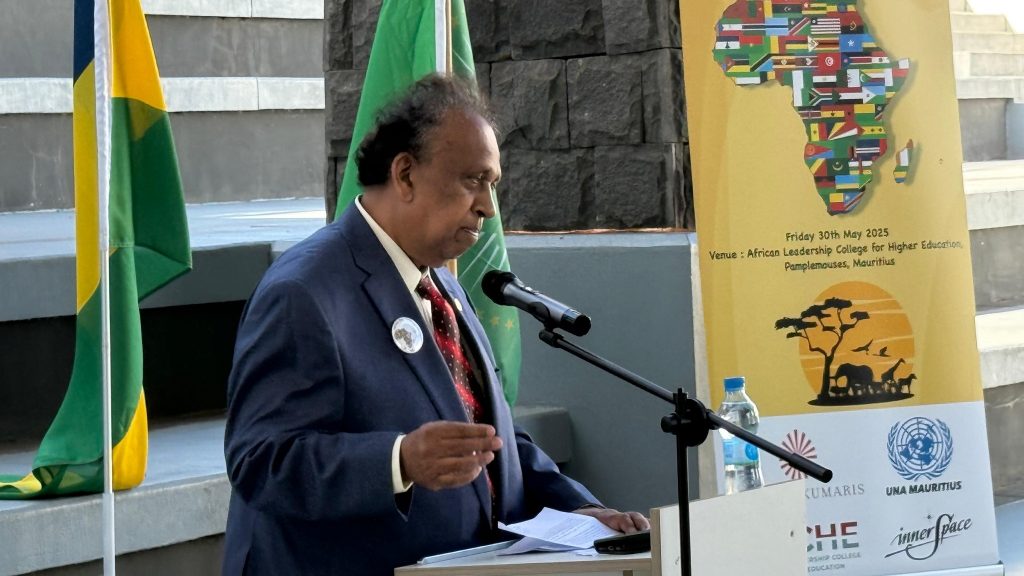
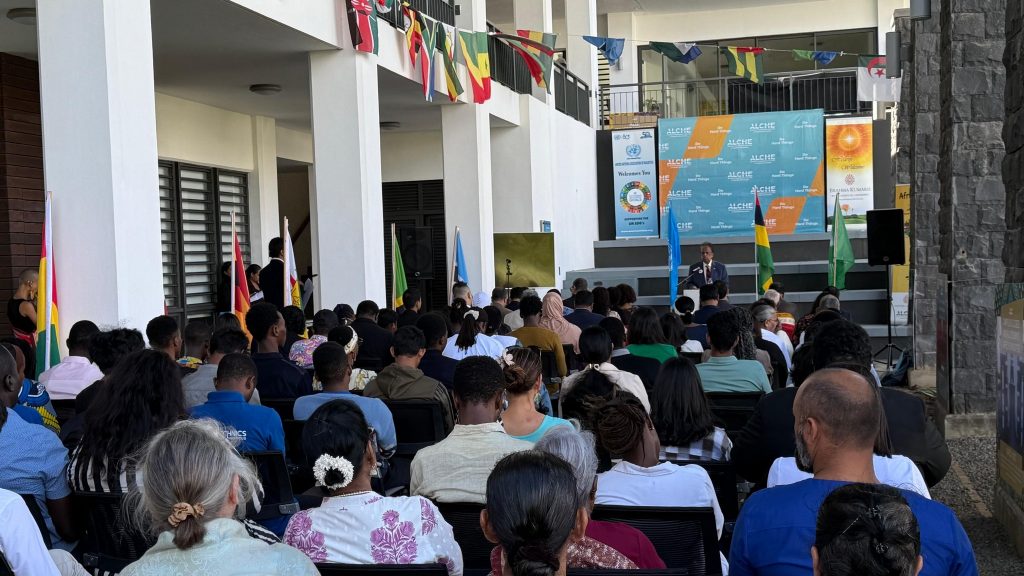
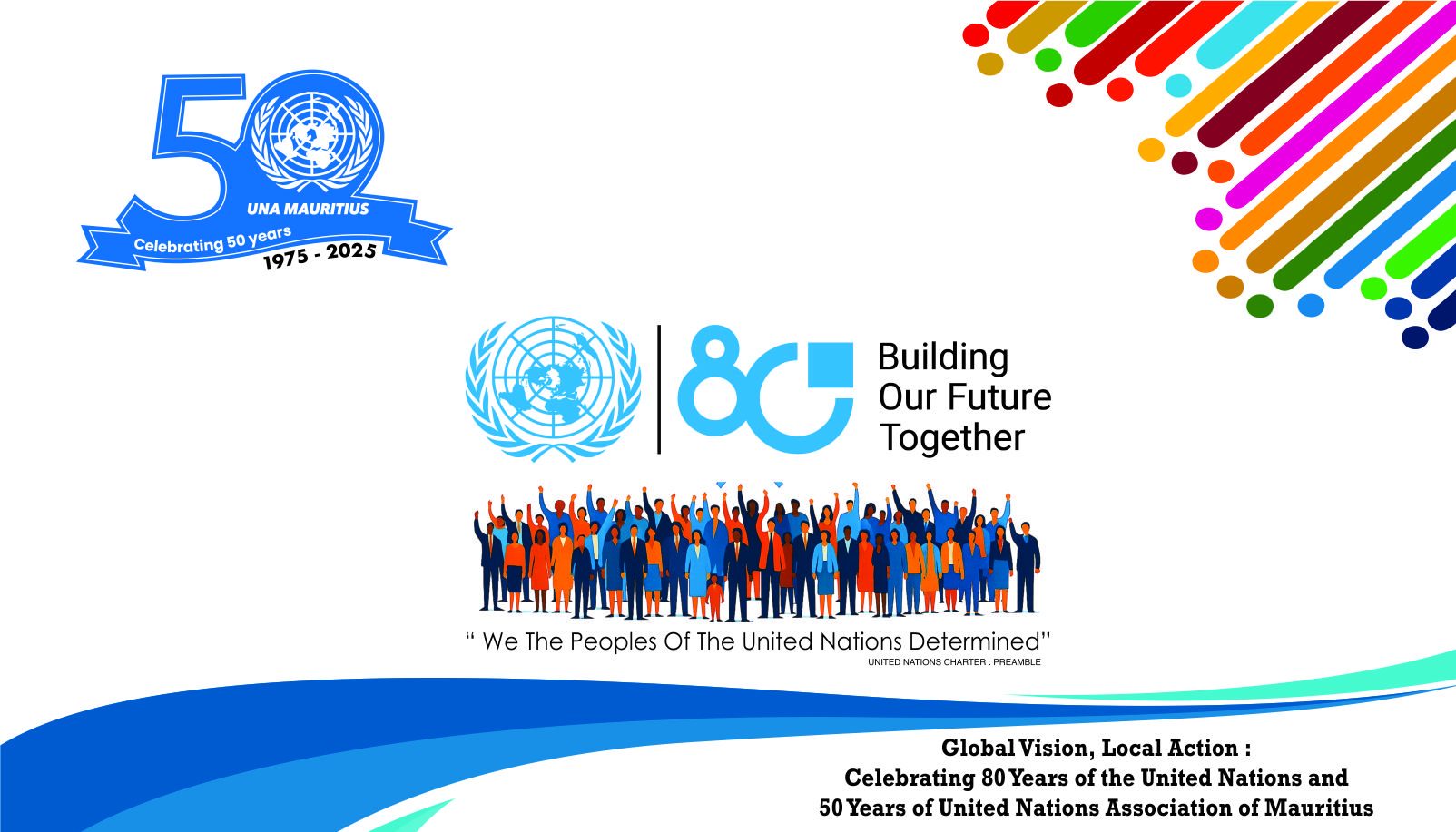
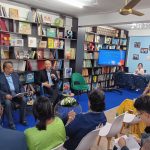
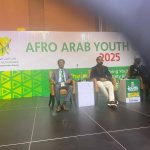
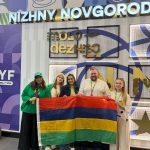
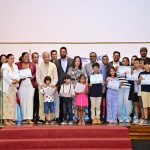
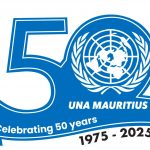

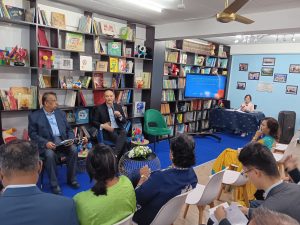
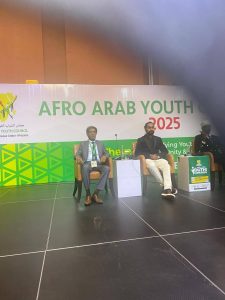
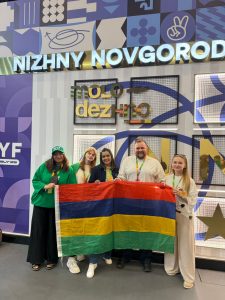
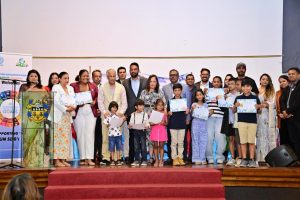
More Stories
SYMPOSIUM AND PHOTO EXHIBITION – PEACE BEYOND BORDERS • • BUILDING A UNITED FUTURE
AFRO-ARAB YOUTH COUNCIL CONGRESS
World Youth Festival Assembly 2025